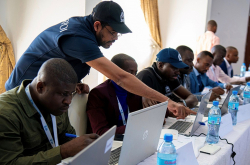Duration: 1 March 2024 – 31 January 2026
Beneficiary countries: Multiple countries in Africa, Asia/Pacific and Latin America
Donor: European Union (Neighbourhood, Development and International Cooperation instrument – NDICI – Global Europe) and the Council of Europe
INTERPOL jointly implements the GLACY-e Project with the C-PROC of the Council of Europe.
The GLACY-e (Global Action on Cybercrime Enhanced) is a Joint project of the European Union (Neighbourhood, Development and International Cooperation instrument – NDICI-Global Europe) and the Council of Europe.
Global Action on Cybercrime Enhanced (GLACY-e) is built on the achievements of the previous GLACY+ project and follow a similar rationale in terms of countries selected for support.
Overall Project Objectives
To strengthen the capacities of States worldwide to apply legislation on cybercrime and electronic evidence, and to enhance their abilities for effective international cooperation in this area and foster South-South cooperation.
1. To promote the adoption and implementation of consistent cybercrime legislation, policies, and strategies.
2. To strengthen the capacity of police authorities to investigate cybercrime and engage in effective police-to-police cooperation.
3. To enable criminal justice authorities to apply legislation and prosecute and adjudicate cases of cybercrime and electronic evidence and engage in international cooperation, in line with international human rights and rule of law standards.
4. To strengthen the capacities of hub countries in building capacity on cybercrime and electronic evidence in their regions and foster their regional role in south-south cooperation.

INTERPOL’s Contribution
INTERPOL implements various Project activities designed to strengthen the capacity of police authorities to investigate cybercrime and engage in effective police-to-police cooperation, and to strengthen the capacities of hub countries in building capacity on cybercrime and electronic evidence in their regions and foster their regional role in south-south cooperation.
- Cybercrime and computer forensics units within Police authorities are strengthened in hub and selected countries and international police-to-police cooperation is more effective.
- Law enforcement officers in hub and selected countries are trained in basic cybercrime investigation and computer forensics, and training strategies are available.
- Inter-agency cooperation in hub and selected countries between law enforcement authorities, financial investigation units (FIUs) and prosecutors on targeting online proceeds of crime to ensure effective confiscation, asset tracing and recovery is enhanced
- Police training centres and other entities in hub countries deliver capacity building programs on cybercrime and electronic evidence at regional level.
- Capacities of police and criminal justice authorities from hub countries to act as centres of expertise and experience, and to share best practices on the investigation, prosecution and adjudication of cybercrime cases and cases involving electronic evidence at regional and international level are strengthened.
The Project has eight countries in Africa, Asia/Pacific and Latin America that serve as hubs and multipliers to share experience, tools, and good practices with the countries of their respective region: Chile, Dominican Republic, Ghana, Senegal, Sri Lanka, Philippines, Mauritius, and Tonga.
Building on the expertise and the experience gained by the hub countries in the previous GLACY+ project, GLACY-e addresses specific needs of selected countries - states in the Global South that are either Parties to the Convention on Cybercrime already or have requested accession and been invited to accede. Additional countries may benefit from support upon request, in particular to enhance domestic legislation with the standards of the Budapest Convention on Cybercrime and its Protocols.
الوثائق ذات الصلة بالموضوع
الأخبار ذات الصلة بالموضوع

تعطيل عملية استُخدمت فيها برمجية Grandoreiro الخبيثة
١٨ مارس، ٢٠٢٤







